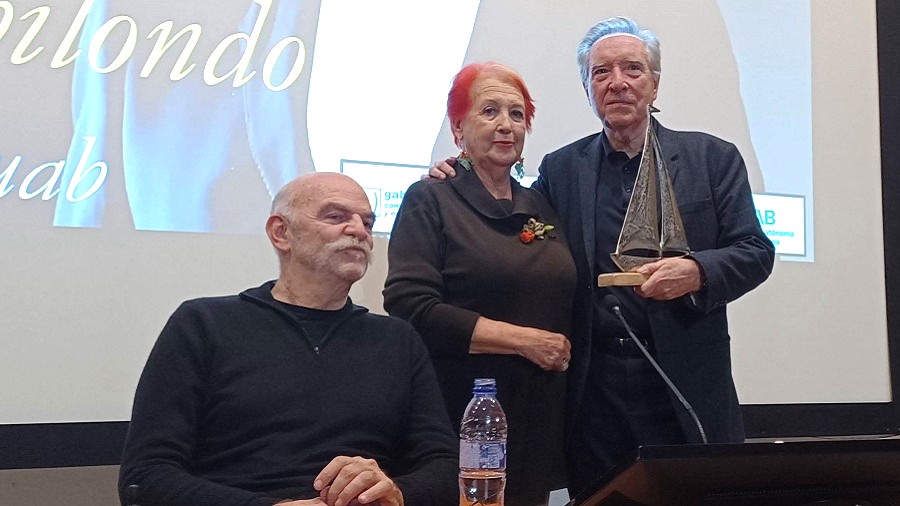Iñaki Gabilondo receives the Ítaca 2023 Award: "If you chose journalism, you did not make a mistake"
Iñaki Gabilondo received the Ítaca 2023 Award yesterday at the Faculty of Communication Studies of the UAB in which he strongly defended the future of journalism as part of the 12th Conference on Travels, Communication and Adventure: Trails and Frontiers, organised by the Cabinet of Communication and Education and the master's degree in Travel Journalism, with the support of the Fundació Autònoma Solidària. Gabilondo received the award from journalist Rosa Maria Calaf, winner of the 2022 edition, and held a debate with Martín Caparrós on the current situation of journalism, which according to Galilondo, "is not in a crisis, it is reinventing itself".

Gabilondo and Caparrós spoke about the transformations in the sector and the role of journalism in today's society, in which we live overwhelmed by large amounts of information on the internet. The Basque-born journalist smiled while he said that, "in a flood, the first thing that is scarce is drinking water", to go on to affirm that journalism must be like "drinking water deposits" in the midst of an information tsunami. For this reason, journalists have a fundamental task in "learning to choose, that is to say, to discard", among all the information, and he addressed the students of the faculty while saying: "if you chose journalism, you did not make a mistake".
For Gabilondo, the journalist "must care about what happens to people", because the profession developed precisely when the rights of citizens began to be recognised and, among them, journalism represents "what you have the right to know as a member of society". The two speakers reflected on the content that is most consumed in the media, and Caparrós asked himself aloud: "Could it be that journalism consists of telling people what they don't want to be told? And he then elaborated on the idea by affirming that "you can write for an audience that does not exist in order to help make it exist a little bit more".
Gabilondo, who has spent "almost sixty years" working mainly in the radio media, spoke of the evolution of radio during his career, in which he has seen such important transformations as the rise of transistor radios and the current digital revolution. And he advised students to focus on the figure of the listener, explaining that he used to speak to his teams in the newsroom by telling them: "remember that our target audience for our activity is not in this studio". The "responsibility" of journalism lies with the recipient of the message, and Gabilondo emphasised the importance of the values of credibility and independence.
A leader in the field
Iñaki Gabilondo studied journalism at the University of Navarra and, throughout a long career that began in the 1960s, he has been, among other responsibilities, presenter of the Telediario and news director of TVE, director of Hora 25 and host of Hoy por Hoy on Cadena SER, presenter of Noticias Cuatro and of many news programmes on different radio and television channels, and author of the videoblog La Voz de Iñaki, for El País and SER.
He has received numerous awards, including several Ondas prizes, the gold medal of the Spanish Radio Academy, the Ortega y Gasset, Víctor de la Serna, Tomás y Valiente and Micrófono de Oro prizes, honorary doctorates from several Spanish universities and the Creu de Sant Jordi from the Generalitat de Catalunya. At yesterday's ceremony of the Ítaca Award, UAB professor of journalism and former president of RTVE José Manuel Pérez Tornero highlighted Gabilondo's "honesty" and "courage", among his many other valuable traits.
The UAB, with Sustainable Development Goals
Quality education
Sustainable cities and communities